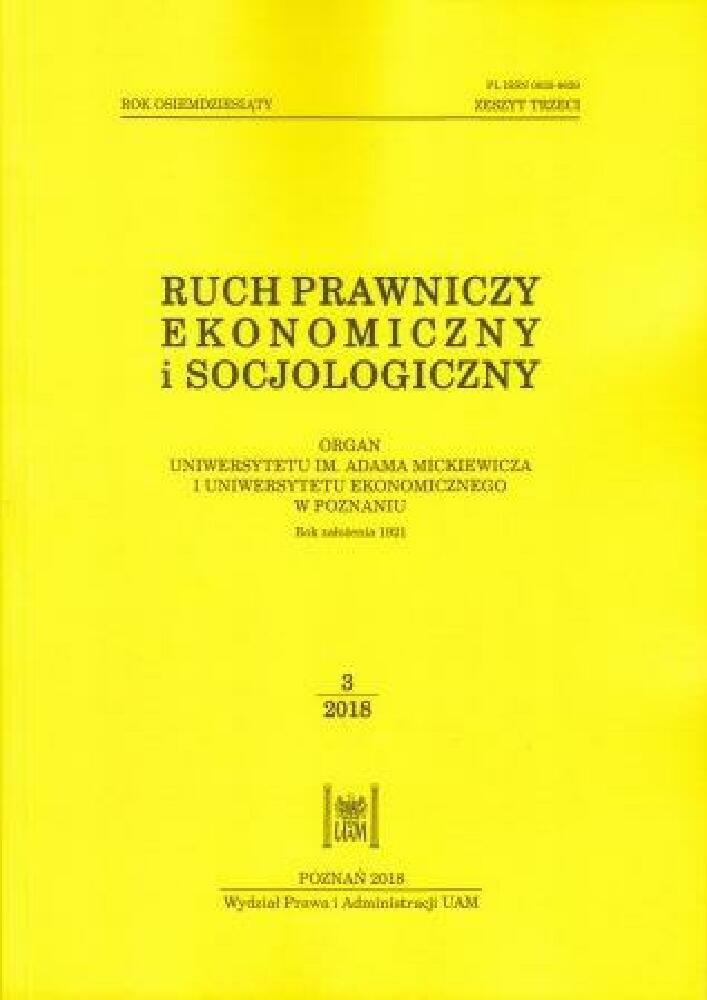Abstract
The agency, as well as restrictions on information are an important issue in the public procurements market. In principal-agent contracts parries to such contracts do not need to have the same knowledge of the subject of the exchange under the contract and the asymmetry of information does indeed determine the behaviour of parties to an agency contract. Hence the terms of anoptimal contract differ from one where both parties have full information. There are four possible ways to mitigate this situation. They are: tender, a large scope of the market, drafting proper contracts and monitoring the contracting parties. The gravity of the problems relating to the agency requires implementation of further solutions, including legal ones.
Funding
National Science Centre
Research Grant – Sonata Bis no. UMO-2014/14/E/HS5/00845
References
Akerlof, G.A. (1970), The market for lemons: quality uncertainty and the market mechanism, The Quarterly Journal of Economics 84(3): 488–500.
Commons, J. (1990), Institutional Economics: Its Place in Political Economy, New Brunswick–London.
Goranczewski, B., Gawlik, A., Szeliga-Kowalczyk, A. (2016), CAF jako narzędzie kształtowania jakości działań instytucji regulacyjnych, Prace Naukowe Wyższej Szkoły Bankowej w Gdańsku 48: 391–402.
Jensen, M., Meckling, W. (1976), Theory of the firm: managerial behavior, agency costs and capital structure, Journal of Financial Economics 3: 305–360.
Laffont, J., Martimort, D. (2002), The Theory of Incentives: The Principal-Agent Model, Princeton.
Rączka, J. (2002), Dlaczego państwo reguluje rynki – pozytywne teorie regulacji ekonomicznej, Ekonomista 3: 414–424.
Skubiszak-Kalinowska, I. Wiktorowska, E. (2018), Prawo zamówień publicznych. Komentarz aktualizowany, Lex/el. 2018.
Staniek, Z. (2017), Ekonomia instytucjonalna. Dlaczego instytucje są ważne, Warszawa.
Stankiewicz, W. (2012), Ekonomia instytucjonalna. Zarys wykładu, Warszawa.
Stankiewicz, W. (2013), Instytucjonalna teoria kontraktów – presja prawa i ekonomii, Ekonomia/Economics 4(25): 273–288.
Szewc-Rogalska, A. (2015), Oportunizm podmiotów i instytucji jako stymulator ryzyka systemowego, Nauki o Finansach 22(1): 91–100.
Tyc, W., Schneider, M. (2017), Kontrakt jako obiekt obserwacji naukowej w teorii ekonomii, Zeszyty Naukowe Uniwersytetu Ekonomicznego w Katowicach 311: 48–60.
Ustawa z 29.01.2004 r. Prawo zamówień publicznych, Dz.U. 2017, poz. 1579.
Wilkin, J. (2016), Instytucjonalne i kulturowe podstawy gospodarowania, Warszawa.
Williamson, O. (1998), Ekonomiczne instytucje kapitalizmu. Firmy, rynki, relacje kontraktowe, Warszawa.
License
Copyright (c) 2018 WPiA UAM

This work is licensed under a Creative Commons Attribution-NonCommercial-NoDerivatives 4.0 International License.





